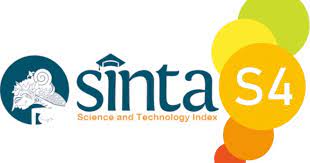Leveraging chatbot applications to enhance English language learning in Nigerian secondary schools
DOI:
https://doi.org/10.22219/englie.v5i2.32802Keywords:
Chatbot Applications, Educational Technology, Implementation Challenges, English Language Learning, Nigerian Secondary SchoolsAbstract
This study explores the potential of chatbot applications to enhance English language learning in Nigerian secondary schools, motivated by the ongoing challenges in achieving high English proficiency using traditional methods. The purpose of the study was to assess the current level of English proficiency among students, evaluate the effectiveness of chatbot applications, understand user perceptions, and identify implementation challenges. A quantitative research design was employed, involving 150 students from three international schools, selected through stratified random sampling. Data were collected using a structured questionnaire and analyzed using descriptive and inferential statistics, along with thematic analysis for qualitative insights. The study revealed varied levels of English proficiency among students’ general positive perceptions of chatbot applications as effective tools for learning English; significant technical and accessibility challenges, such as poor internet connectivity and limited device availability; and the necessity of comprehensive training for both students and teachers to maximize the benefits of chatbot applications. The study concludes that while chatbot applications have considerable potential to improve English language skills, addressing the identified challenges is crucial. Recommendations included enhancing infrastructure, providing comprehensive training, and improving the software and user interface of chatbot applications to maximize their educational benefits. These insights aim to inform educators, policymakers, and technology developers on optimizing the use of chatbot applications in language education.
Downloads
References
Alabbas, A., & Alomar, K. (2024). Tayseer: A Novel AI-Powered Arabic Chatbot Framework for Technical and Vocational Student Helpdesk Services and Enhancing Student Interactions. Applied Sciences, 14(6), Article 6. https://doi.org/10.3390/app14062547
Antón-Solanas, I., Coelho, M., Huércanos-Esparza, I., Vanceulebroeck, V., Kalkan, I., Cordeiro, R., Kömürkü, N., Soares-Coelho, T., Hamam-Alcober, N., Dehaes, S., Casa-Nova, A., & Sagarra-Romero, L. (2020). The Teaching and Learning Cultural Competence in a Multicultural Environment (CCMEn) Model. Nursing Reports, 10(2), Article 2. https://doi.org/10.3390/nursrep10020019
Aristovnik, A. (2014, April). Development of the information society and its impact on the education sector in the EU: Efficiency at the regional (NUTS 2) level [MPRA Paper]. https://mpra.ub.uni-muenchen.de/56455/
Ayeni, A. J. (2020). Principals’ instructional time management and students’ academic performance in secondary schools in Ondo North senatorial district of Ondo State, Nigeria. Journal of Education and Learning (EduLearn), 14(1), Article 1. https://doi.org/10.11591/edulearn.v14i1.14743
Bayyurt, Y., Kurt, Y., Öztekin, E., Guerra, L., Cavalheiro, L., & Pereira, R. (2019). English Language Teachers’ Awareness of English as a Lingua Franca in Multilingual and Multicultural Contexts. Eurasian Journal of Applied Linguistics, 5(2), Article 2. https://doi.org/10.32601/ejal.599230
Chapelle, C. A., & Sauro, S. (2017). Interactionist SLA theory in CALL research. Language Teaching, 50(4), 455-494.
Fonseca, K. A. B., & Peralta, F. S. (2019). Google Classroom: An Effective Virtual Platform to Teach Writing in an EFL Composition Course. International Journal of English Language Teaching, 6(1), Article 1. https://doi.org/10.5430/ijelt.v6n1p27
Freeman, S., Eddy, S. L., McDonough, M., Smith, M. K., Okoroafor, N., Jordt, H., & Wenderoth, M. P. (2014). Active learning increases student performance in science, engineering, and mathematics. Proceedings of the National Academy of Sciences, 111(23), 8410–8415. https://doi.org/10.1073/pnas.1319030111
Guo, F. & Wu, X. (2019). The Application of Multimedia Technology in College English Reading Teaching: A Survey Based on Language Learning Strategies. International Journal of English Language, 6(2), 27-32. https://doi.org/10.5430/ijelt.v6n2p27
Huang, W., Hew, K. F., & Fryer, L. K. (2022). Chatbots for language learning—Are they really useful? A systematic review of chatbot‐supported language learning. Journal of Computer Assisted Learning, 38(1), 237-257. https://doi.org/10.1111/jcal.12610
Jegede, O. (2021). Mobile-Assisted Language Learning and Online Cooperative Language Learning: Merits and Demerits.
Jegede, O. (2022). Digitising English Language Teaching and Learning for e-Generation Students in Nigeria. 204–212.
Kachlicka, M., Saito, K., & Tierney, A. (2019). Successful second language learning is tied to robust domain-general auditory processing and stable neural representation of sound. Brain and Language, 192, 15–24. https://doi.org/10.1016/j.bandl.2019.02.004
Kim, Y. J. (2023). The PBL teaching method in neurology education in the traditional Chinese medicine undergraduate students: An observational study. Medicine, 102(39), e35143. https://doi.org/10.1097/MD.0000000000035143
Kohnke, L., Moorhouse, B. L., & Zou, D. (2023). ChatGPT for Language Teaching and Learning. RELC Journal, 54(2), 537–550. https://doi.org/10.1177/00336882231162868
Kuhail, M. A., Alturki, N., Alramlawi, S., & Alhejori, K. (2023). Interacting with educational chatbots: A systematic review. Education and Information Technologies, 28(1), 973–1018. https://doi.org/10.1007/s10639-022-11177-3
Li, Y., Sun, M., & Wu, D. (2018). Improving oral English learning through chatbot-assisted task-based learning. Computers & Education, 127, 178-189.
McTear, M. F., Callejas, Z., Griol, D., & Keizer, S. (2016). The Conversational Interface: Talking to Smart Devices. Springer. https://doi.org/10.1007/978-3-319-32967-3
Muhammed, A. A. (2014). The Impact of Mobiles on Language Learning on the Part of English Foreign Language (EFL) University Students. Procedia - Social and Behavioral Sciences, 136, 104–108. https://doi.org/10.1016/j.sbspro.2014.05.297
Qin, L. (2024). Adaptive System of English-Speaking Learning Based on Artificial Intelligence. Journal of Electrical Systems, 20(6s), Article 6s. https://doi.org/10.52783/jes.2637
Rudd, M. (2019). The Significance of English Proficiency in Reforming Nigerian Education and Society. International Journal of African and Asian Studies, 56(0), 67.
Sadeghi, M. (2019). A Shift from Classroom to Distance Learning: Advantages and Limitations. International Journal of Research in English Education, 4(1), 80–88. https://doi.org/10.29252/ijree.4.1.80
Steele, J. L., Slater, R. O., Zamarro, G., Miller, T., Li, J., Burkhauser, S., & Bacon, M. (2017). Effects of Dual-Language Immersion Programs on Student Achievement: Evidence From Lottery Data. American Educational Research Journal, 54(1_suppl), 282S-306S. https://doi.org/10.3102/0002831216634463
Tan, J. (2024). An Empirical Study of Adaptive Learning Algorithm Based on Intrinsic Motivation in English Online Teaching and Learning. Journal of Electrical Systems, 20(6s), Article 6s. https://doi.org/10.52783/jes.3088
Tom-Lawyer, O., Thomas, M., & Kalane, M. (2021). Examining the Status of English as a Medium of Instruction in Sub-Saharan Africa: A Comparative Study of Botswana and Nigeria. European Scientific Journal, ESJ, 17, 51. https://doi.org/10.19044/esj.2021.v17n36p51
Unal, S. & Gurol, M. (2019). Online Cooperation in English Language Learning. Journal of Education and Practice, 10(36), 79-83. https://doi.org/10.7176/JEP/10-36-09
Umek, L., Keržič, D., Aristovnik, A., & Tomaževič, N. (2015). Analysis of Selected Aspects of Students’ Performance and Satisfaction in a Moodle-Based E-Learning System Environment. Eurasia Journal of Mathematics, Science and Technology Education, 11(6), 1495–1505. https://doi.org/10.12973/eurasia.2015.1408a
Wallace, A. (2014). Social Learning Platforms and the Flipped Classroom. International Journal of Information and Education Technology, 4(4), 293–296. https://doi.org/10.7763/IJIET.2014.V4.416
Xu, Z. (2017). Apply Multimedia to College English Reading Teaching. Chinese Education Academic Journal, 12, 102-110.
Zuniga, L. (2015). EFL Professors’ perceptions and intentions towards the integration of the tools in UNA Virtual Program at UNA Brunca Campus. Effective Teaching Practices: The Key to Maximising Learning, 458-475.
Downloads
Published
How to Cite
Issue
Section
License
Copyright (c) 2024 Jegede, O. O

This work is licensed under a Creative Commons Attribution-ShareAlike 4.0 International License.
Authors who publish with English Learning Innovation (englie) agree to the following terms:
- For all articles published in English Learning Innovation (englie), copyright is retained by the authors. Authors give permission to the publisher to announce the work with conditions. When the manuscript is accepted for publication, the authors agree to automatic transfer of the publishing right to the publisher.
- Authors retain copyright and grant the journal right of first publication with the work simultaneously licensed under a Creative Commons Attribution-ShareAlike 4.0 International License that allows others to share the work with an acknowledgement of the work's authorship and initial publication in this journal.
- Authors are able to enter into separate, additional contractual arrangements for the non-exclusive distribution of the journal's published version of the work (e.g., post it to an institutional repository or publish it in a book), with an acknowledgment of its initial publication in this journal.
- Authors are permitted and encouraged to post their work online (e.g., in institutional repositories or on their website) prior to and during the submission process, as it can lead to productive exchanges, as well as earlier and greater citation of published work (See The Effect of Open Access).
This work is licensed under a Creative Commons Attribution-ShareAlike 4.0 International License.
















1.png)












